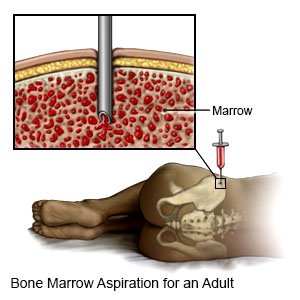Bone Biopsy
Medically reviewed by Drugs.com. Last updated on Jun 5, 2024.
AMBULATORY CARE:
A bone biopsy
is a procedure to take a sample of bone tissue. It may be done with a needle or during surgery. A bone biopsy may be done to test for cancer, infection, or bone disease.
How to prepare for a bone biopsy:
- You may need blood or urine tests before the procedure. Your healthcare provider will talk to you about how to prepare for the biopsy. You may be told not to eat or drink anything after midnight on the day of your biopsy. Your provider will tell you which medicines to take or not take on the day of your biopsy.
- You may be given an antibiotic through your IV to help prevent a bacterial infection. Contrast liquid may be used during the procedure to help the bone or tumor show up better in pictures. Tell your healthcare provider if you have an allergy to contrast liquid. You will need someone to drive you home after the biopsy.
What will happen during a bone biopsy:
- You may be given general anesthesia to keep you asleep and free from pain during the biopsy. You may get general anesthesia if your healthcare provider needs to make an incision to remove a larger piece of bone. You may instead be given local anesthesia with medicine to help you relax. With local anesthesia, you may still feel pressure or pushing during the biopsy, but you should not feel any pain. Your provider may use contrast liquid to help your bone show up better in pictures. The provider may use it in both types of bone biopsies.
- If a bone biopsy will be done with a needle, your provider will insert a needle through your skin and into your bone. A small amount of bone tissue will be removed through the needle. Your provider will take the needle out and hold pressure on the area for several minutes. A small bandage will be placed over the area to prevent infection.

- If your provider needs to remove a larger piece of bone, an incision will be made in your skin. Your provider may use a drill to remove a piece of your bone. Cement or a metal rod may be placed into your bone to prevent it from breaking. Your provider may close the incision with stitches or surgical tape and cover it with a bandage.
What will happen after a bone biopsy:
You will be monitored by healthcare providers until you are awake and your vital signs are stable. Your vital signs include your blood pressure, heart rate, and breathing. You may need an x-ray to look for breaks in your bone. You may go home after your procedure or may need to spend the night in the hospital.
Risks of a bone biopsy:
You may bleed more than expected. Your bone may become infected or weak. Your bone may break during or after the procedure. The needle may break and cause nerve or blood vessel damage. You may have swelling, bruising, and pain.
Seek care immediately if:
- Blood soaks through your bandage.
- Your stitches come apart.
- Your bone breaks.
Contact your healthcare provider if:
- You have a fever or chills.
- Your wound is red, swollen, or draining pus.
- You have nausea or vomiting.
- Your skin is itchy, swollen, or you have a rash.
- You have questions or concerns about your condition or care.
Care for your wound as directed:
Remove your bandage as directed. If you have strips of medical tape over your incision, allow them to fall off on their own. If they do not fall off within 14 days, gently peel them off. Carefully wash the wound with soap and water. Dry the area and put on new, clean bandages as directed. Change your bandages when they get wet or dirty. Do not go in hot tubs or take baths for 48 hours or as directed by your healthcare provider. Check your wound every day for signs of infection such as redness, swelling, or pus.
Self-care:
- Apply ice on your bone for 15 to 20 minutes every hour or as directed. Use an ice pack, or put crushed ice in a plastic bag. Cover it with a towel. Ice helps prevent tissue damage and decreases swelling and pain.
- Do not exercise for at least 48 hours. Too much activity may prevent healing. Rest and do quiet activities. Ask your healthcare provider when you can drive and return to your normal activities.
- Elevate your arm or leg above the level of your heart as often as you can. This will help decrease swelling and pain. Prop your arm or leg on pillows or blankets to keep it elevated comfortably.
- Drink liquids as directed. Liquid will help flush the contrast liquid out of your body. Ask how much liquid to drink each day and which liquids are best for you.
Follow up with your healthcare provider as directed:
Your healthcare provider will call you with the results of your biopsy. Write down your questions so you remember to ask them during your visits.
© Copyright Merative 2024 Information is for End User's use only and may not be sold, redistributed or otherwise used for commercial purposes.
The above information is an educational aid only. It is not intended as medical advice for individual conditions or treatments. Talk to your doctor, nurse or pharmacist before following any medical regimen to see if it is safe and effective for you.
Further information
Always consult your healthcare provider to ensure the information displayed on this page applies to your personal circumstances.
